History and profile
Sodobnost was established in 1933 [1] by a group of left liberal intellectuals around Fran Albrecht, Josip Vidmar and Ferdo Kozak, who had left the national liberal magazine Ljubljanski zvon [1] in disagreement with its appeasing policies towards the dictatorship of King Alexander I of Yugoslavia and the centralist and non-democratic policies of the Yugoslav National Party. Its first two editors were the literary critic Josip Vidmar and author Ferdo Kozak. After 1935 the magazine became one of the strongest supporters of the creation of a Slovenian Popular Front, that is of a broad coalition of left wing groups that would fight against the threat of Fascism and for Slovenian autonomy within Yugoslavia. In a period when the Communist party was outlawed in the Kingdom of Yugoslavia, the magazine enabled many prominent Communists to publish articles under pseudonyms; among them were Edvard Kardelj, Boris Kidrič, and Ivo Brnčič. In the artistic and literary sense, Sodobnost became the main platform for neo-realist and social realist authors, such as Prežihov Voranc, Ciril Kosmač, Miško Kranjec, Ivan Potrč, Ludvik Mrzel and others.
Following the Axis invasion of Yugoslavia in April 1941 the magazine closed down. [1] After World War II the magazine was re-established as Novi svet ("New World"), which changed its name to Naša sodbonost ("Our Contemporary Time") in 1952, thus re-establishing the tradition with the interwar journal. Between 1946 and 1955, it mostly served as a means of cultural propaganda of the new Communist regime. During this time, it was edited by Boris Ziherl, the main cultural ideologist of the Communist Party of Slovenia. In 1955, Ziherl was replaced by a more pragmatic editorial board, and in 1963 it assumed its original name, Sodobnost. [2] The following year, the literary historian and philosopher Dušan Pirjevec joined the editorial board, raising the overall intellectual level of the magazine. During this period, the contributors and editors of Sodobnost engaged in a long and sharp polemic with the alternative magazine Perspektive (edited by Taras Kermauner, Janko Kos, Dominik Smole and Dane Zajc), which assumed a more critical stand towards the Titoist regime. When the Perspektive were dissolved by the regime in 1964, the editors of Sodobnost published a solidarity note, and were replaced by the regime, as well.
After a period of crisis in 1964-1965, the new editorial board (headed by the poet Ciril Zlobec) shifted the attitude of the magazine to moderate and pragmatic positions, which opened the magazine to all quality contributors who were not openly and militantly against the prevailing policies in Yugoslavia and Slovenia. Between the mid 1960s and early 1980s, Sodobnost enjoyed the status of the most prestigious magazine in Slovenia; after that, it went into a gradual but continuous decline. In the late 1990s, under the editor Evald Flisar it became more influential again.
Notable contributors
Many notable authors, critics and journalists have contributed to Sodobnost. Those include, besides the already mentioned, essayists Jože Javoršek and Primož Kozak, historians Bogo Grafenauer and Igor Grdina, author and sociologist Igor Škamperle, sociologist and politician Lev Kreft, poets Igo Gruden, Edvard Kocbek, Janez Menart, Miodrag Bulatović, Josip Osti, Iztok Osojnik and Niko Grafenauer, critic Bojan Štih, writers Prežihov Voranc, Igor Torkar, Lojze Kovačič, Dušan Šarotar and many others. The work of Egyptian novelist Naguib Mahfouz was also published in the magazine. [3]
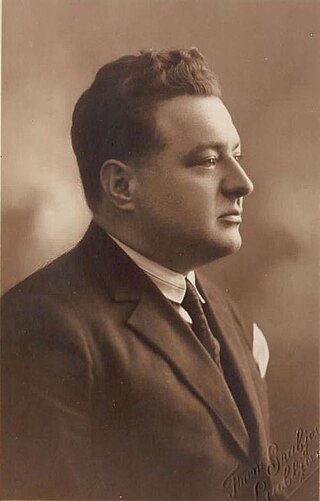
Igo Gruden was a Slovene poet and translator.

Ivan Cankar was a Slovene writer, playwright, essayist, poet, and political activist. Together with Oton Župančič, Dragotin Kette, and Josip Murn, he is considered as the beginner of modernism in Slovene literature. He is regarded as the greatest writer in Slovene, and has sometimes been compared to Franz Kafka and James Joyce.

The League of Communists of Slovenia was the Slovenian branch of the League of Communists of Yugoslavia, the sole legal party of Yugoslavia from 1945 to 1990. It was established in April 1937 as the Communist Party of Slovenia and was the first autonomous sub-national branch of the federal party. Its initial autonomy was further amplified with the Yugoslav constitution of 1974, which devolved greater power to the various republic level branches.

Dane Zajc was a Slovenian poet and playwright. He served as president of the Slovene Writers' Association (1991–1995), and was awarded the prestigious Prešeren Award for lifetime achievement (1981). Together with Edvard Kocbek and Gregor Strniša, he is considered the most important Slovenian poet of the second half of the 20th century.

Fran Albreht was a Slovenian poet, editor, politician and partisan. He also published under the pseudonym Rusmir.
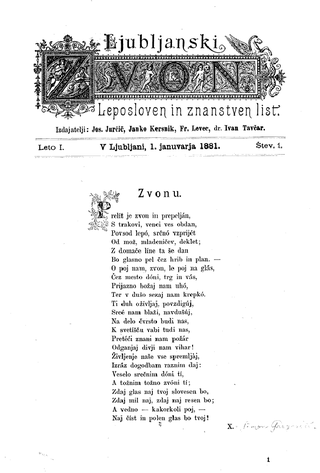
Ljubljanski zvon was a journal published in Ljubljana in Slovene between 1881 and 1941. It was considered one of the most prestigious literary and cultural magazines in Slovenia.

The Slovene Society is the second-oldest publishing house in Slovenia, founded on 4 February 1864 as an institution for the scholarly and cultural progress of Slovenes.

Ivo Brnčić or Brnčič was a Yugoslav author, essayist and literary critic of Croat origin, particularly notable for his assessment of interwar Slovene literature. Most of his works were published posthumously.
Dušan Pirjevec, known by his nom de guerre Ahac, was a Slovenian Partisan, literary historian and philosopher. He was one of the most influential public intellectuals in post–World War II Slovenia.
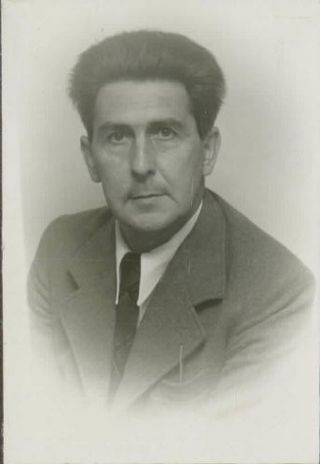
Ferdo Kozak was a Slovenian author, playwright, editor and politician.
Primož Kozak was a Slovenian playwright and essayist. Together with Dominik Smole, Dane Zajc and Taras Kermauner, he was the most visible representative of the so-called Critical generation, a group of Slovenian authors and intellectuals that reflected on the paradoxes of the communist regime, and the relation between power and individual existence in general.
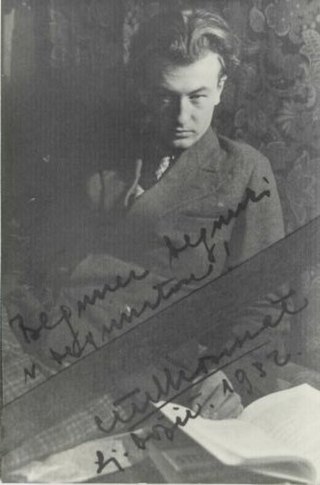
Ciril Kosmač was a Slovenian novelist and screenwriter.
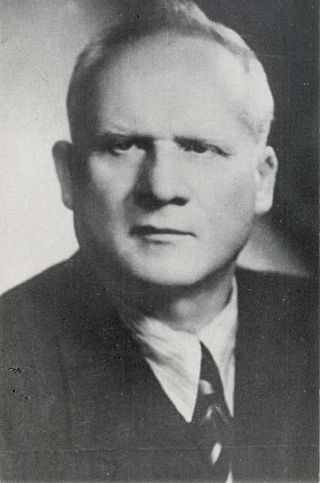
Prežihov Voranc was the pen name of Lovro Kuhar, a Slovene writer and communist political activist. Voranc's literary reputation was established during the 1930s with a series of Slovene novels and short stories in the social realist style, notable for their depictions of poverty in rural and industrial areas of Slovenia. His most important novels are Požganica (1939) and Doberdob (1940).
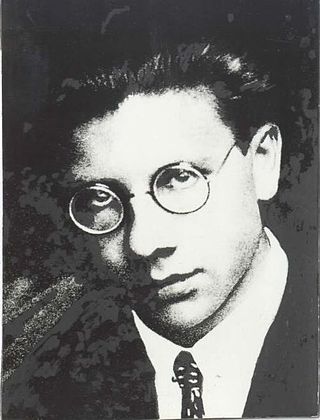
Anton Vodnik was a Slovenian poet, art historian, and critic. He was one of the most notable representatives of Slovene Catholic expressionism in the interwar period.

Venčeslav "Veno" Taufer was a Slovenian poet, essayist, translator and playwright. Under the Communist regime, he was a driving force behind alternative cultural and intellectual projects in Socialist Slovenia, which challenged the cultural policies of the Titoist system. During the Slovenian Spring (1988–1990), he actively participated in the efforts for the democratization and independence of Slovenia.
Nova revija is a Slovene language literary magazine published in Slovenia.
This page is based on this
Wikipedia article Text is available under the
CC BY-SA 4.0 license; additional terms may apply.
Images, videos and audio are available under their respective licenses.












